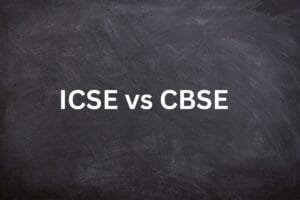Are you an aspiring student in India trying to decide between ICSE or CBSE? Or maybe you’re just curious about what sets these two educational boards apart? Whether you’re a parent, a student, or someone new to the Indian education system, understanding the differences between ICSE (Indian Certificate of Secondary Education) and CBSE (Central Board of Secondary Education) is essential for making informed decisions. This blog post will guide you through their key differences, help you choose the right board, and provide insights into their strengths.

Key Differences Between ICSE and CBSE
Before diving deeper, let’s break down some fundamental aspects that distinguish these boards:
History
CBSE: Founded in 1932 by a group of prominent educators. It was initially known as the Central Board of Secondary Education.
ICSE: Established in 1947 by the Indian Certificate of Secondary Education Council (CIIL). It evolved into the Indian School Certificate Examination (ISCE).
Scope
CBSE: Primarily focuses on CBSE Affiliated schools, which are a mix of public and private institutions across India.
ICSE: Targets ICSE Affiliated schools, including many government-run institutions as well as renowned boarding schools.
Syllabus and Exam Pattern
Both boards follow a similar syllabus for classes 9 to 10 but diverge significantly in class 12 exams:
CBSE Class 12: Offers more subjects compared to CBSE Class 12.
ICSE Class 12: Allows students to opt for Practical Exams, which is not possible in CBSE.
Admission Process
CBSE: Consistently follows a centralized admission process with uniform marking schemes across all affiliated schools.
ICSE: Employs a more localized approach due to its regional nature, leading to varied marking standards.
Future Prospects
CBSE Syllabus: Recognized by most Indian universities and competitive exams like JEE (Joint Entrance Examination) and NEET (National Eligibility cum Entrance Test).
ICSE Syllabus: Highly regarded in international contexts, especially for students interested in studying abroad.
Choosing the Right Board for You
Deciding between ICSE or CBSE depends on your personal preferences and future goals:
Interest in Mathematics and Science
If you’re passionate about mathematics and science, consider the differences in syllabi:
– CBSE focuses more on applied sciences.
– ICSE offers a broader range of subjects, including theoretical physics.
Desire for Practical Exams
Only available in ICSE starting from class 12, Practical exams can enhance your understanding of concepts like chemistry and biology.
Recognition Beyond India
If you plan to study abroad or pursue competitive exams:
CBSE syllabi are widely accepted in India.
ICSE syllabi are recognized globally, particularly in countries with strong academic standards.
Key Differences in Structure
| Aspect | CBSE | ICSE |
|———————-|——————————-|——————————-|
| Syllabus Coverage| Limited to a few subjects | Offers a broader range |
| Admission Process| Centralized and uniform | Regionalistic with varied marks|
| Future Prospects | Strong academic reputation | Highly regarded internationally |
Final Thoughts
Both CBSE and ICSE are prestigious boards that can propel your academic journey to new heights. The choice between the two largely depends on your interests, goals, and the type of education you wish to pursue.
If you aim for a standardized, centralized admission process and want to focus on applied sciences, CBSE is an excellent choice.
If you’re drawn to theoretical knowledge, diverse subjects, and international recognition, ICSE might be the better fit.
Whatever your decision, ensure you choose a board that aligns with your strengths and ambitions. Remember to consult official resources like their websites (cbse.gov.in or cisce.org) for updated syllabi and exam patterns.
FAQs: Choosing Between CBSE and ICSE
Which is harder?
The difficulty level depends on the student’s aptitude in specific subjects.
Scope of CBSE vs. ICSE?
CBSE has a broader reach within India, while ICSE offers more international recognition.
Which syllabus is better for competitive exams like NEET or JEE?
Both syllabi are excellent; however, CBSE is often preferred for exams requiring uniform standards.
Can I switch from CBSE to ICSE or vice versa after 10th?
Generally not allowed without special permission, as the board changes significantly in class 12.
Which board offers more Practical Exams?
Only ICSE allows students to opt for Practical Exams in class 12.
Conclusion
CBSE and ICSE are two of India’s most respected educational boards, each with its unique strengths. While both can lead to successful academic careers, the choice between them should be based on your personal interests, career aspirations, and the type of education you wish to pursue. Whichever board you choose, focus on scoring well in your exams and building a strong foundation for your future. Good luck!



